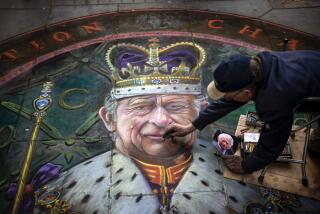A Toast to a Beginning, and an End
- Share via
HONG KONG — When all was said and done and the Britannia had sailed for home, leaving Hong Kong with its memories and its hopes; when the toasts were made, the champagne had been drunk and the exchange of sovereignty was complete, this much could be said with certainty: Hong Kong threw itself the mother of all parties.
For one midnight’s passing on the clock of history, this monument to free enterprise, attached to China like a bejeweled appendage, was where people wanted to be. Twelve years in the planning, the celebration was the party of the century, one at which guests could, without moving an inch, go to bed one night in the British empire and awake the next morning in China.
The list of invited guests topped 100,000. An intimate banquet Monday night sat 4,000. And for the five-day holiday declared to mark Hong Kong’s return to China, more than 6,300 journalists prowled the territory’s streets and hotel lobbies, recording every utterance and all asking the same question: “What do you think will happen now that the British are leaving?”
Upward of a million people--princes and paupers, presidents and bankers and common laborers, famous TV personalities and forgotten politicians--packed the shores of Hong Kong Harbor to witness a thunderous fireworks display and the countdown to midnight. It came 156 years and 32 weeks after Commodore James Bremer planted the Union Jack on what is now Possession Street.
“Who wouldn’t want to be here and see history being made?” said film producer Tamara Asseyev, who flew in from Los Angeles and watched the festivities aboard one of the yachts that transformed the outer reaches of the spectacular harbor into a freeway of water-borne traffic jams.
With many visitors having made their reservations for the hand-over years in advance, Hong Kong’s hotels elevated gouging to an art form, doubling room rates to $500 and $600 a night and insisting on a six-day minimum stay. But no one seemed to mind; Hong Kong, already seething with energy and profit, partied on, awash in champagne and banners and strings of lights that spilled down the sides of its clustered skyscrapers.
“When this is over, I’m going to sleep for a week,” said Ray Pang, hauling six more cases of champagne out of storage at his liquor store. “People are in the mood to celebrate, whether they support the hand-over or not.”
Many younger British residents responded to the historic moment by drinking heavily. Mocking the slogan that summarizes China’s promise to maintain Hong Kong’s freedoms--”one country, two systems”--a party at the Hong Kong Yacht Club, one of the last predominantly British bastions of the territory, was built on the theme “one country, two hangovers.”
*
At the Foreign Correspondents Club, which moved here from Shanghai in 1949 when the Communists took over mainland China, members stood three-deep at the bar, as celebrators did at almost every bar in this city of 6.3 million, and raised a toast to what in effect was both a beginning and an end.
In the passing of every era there are bittersweet fragrances--especially if, like Ian Macpherson, you’ve been through a hand-over before and seen the British flag unfurled for the last time somewhere. The first for him was in 1961, in Dar es Salaam, where as a young military officer he stood at attention while Tanganyika--now Tanzania--became independent and a stadium full of Africans sang the new national anthem.
“That was very different, though, because many of us wondered if Tanzania was really ready for independence,” said Macpherson, who has been here for 25 years. “In Hong Kong, I celebrate the fact that we have built something so sophisticated, so special.
“I’m staying. My wife is a Hong Kong Chinese. We have a wonderful lifestyle, a good business. I don’t anticipate anything changing. Naturally, I’m a little sad to see the Union Jack come down and the Britannia sail away, but the world can’t stay as it was.”
Whether people were celebrating a birth or mourning a death depended on whom one asked.
“I’m glad to see them go; now I am a Chinese again,” said Liu Cheung, bare chested and sandal-clad, pausing to lean on his shovel outside a mall, where the sauna-like humidity was as thick as fog. Inside the air-conditioned mall, whose shops bore names such as Gucci, Alfred Dunhill, Cartier and Christian Dior, Britain’s outgoing governor, Chris Patten, was on one of his populist “walkabouts.” Thousands of Hong Kong Chinese cheered and reached out to shake his hand.
Hong Kong’s appeal to Western wanderers always went beyond mere prosperity. This is where two worlds, East and West, met.
Linda Wong runs a stable of 14 dancers at the San Francisco Club and was doing no business whatsoever Monday night. Her normal customers, mostly Westerners, pay $30 to buy one of her women a drink and $500 for other favors.
*
The end of British rule had only two hours left to run, and Wong, although hardly nostalgic, was already fretting that perhaps the Chinese would be less tolerant than the British. “Let’s wait and see,” she said, her eye on the curtained door through which no customers came.
In the streets outside, hordes of pedestrians milled about with no apparent destination. Neon lights flickered on storefronts, casting reflections on wet sidewalks. Mercedes-Benzes navigated around traffic barriers that police had erected to enable VIPs to move swiftly to hand-over ceremonies.
At the stroke of midnight, with a Chinese military band playing “The March of the Volunteers,” the future arrived for the people of China’s newest city. And Hong Kong, like India and Kenya and so many other places before it, became part of Britain’s colonial past.
More to Read
Sign up for The Wild
We’ll help you find the best places to hike, bike and run, as well as the perfect silent spots for meditation and yoga.
You may occasionally receive promotional content from the Los Angeles Times.






